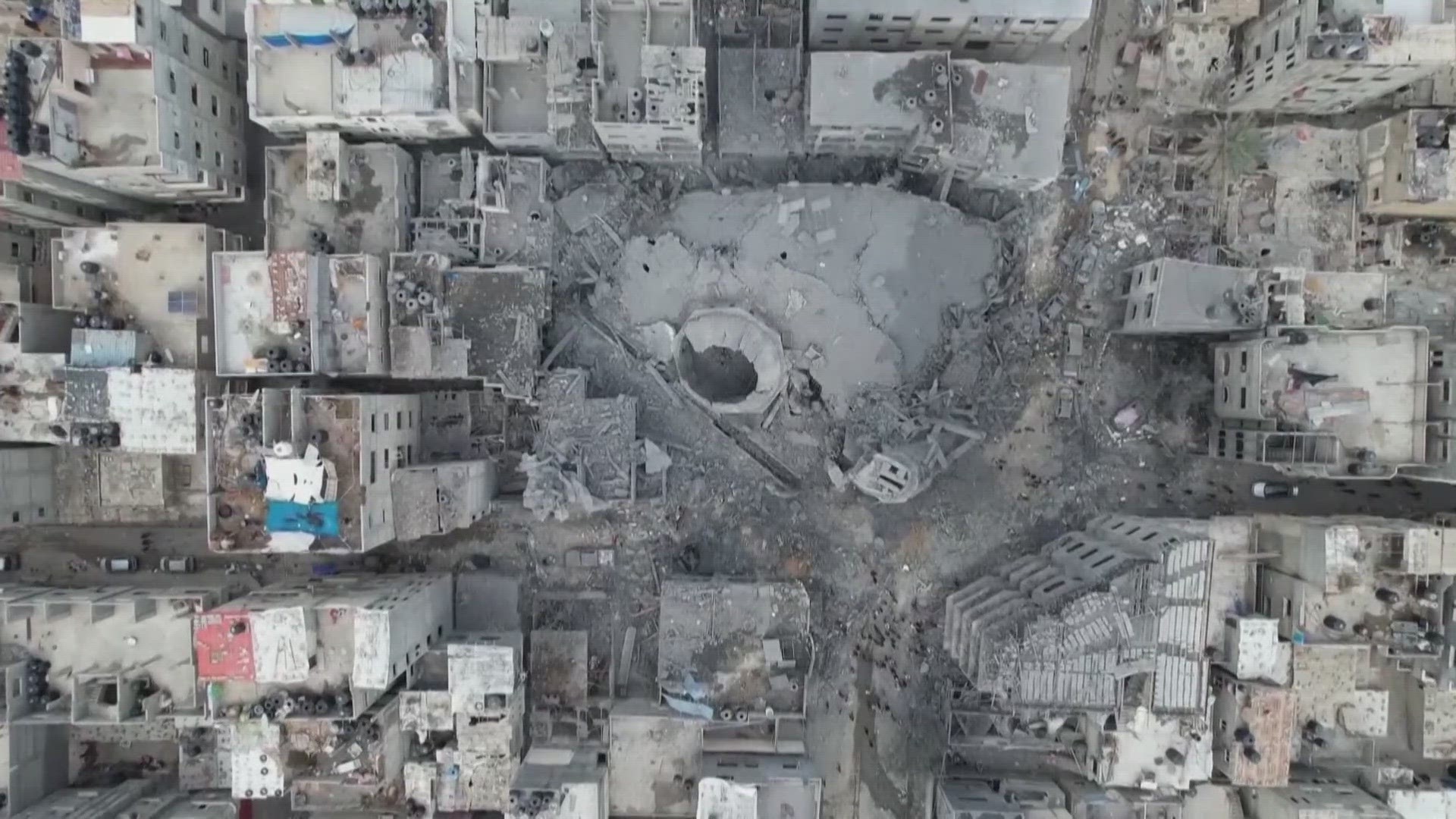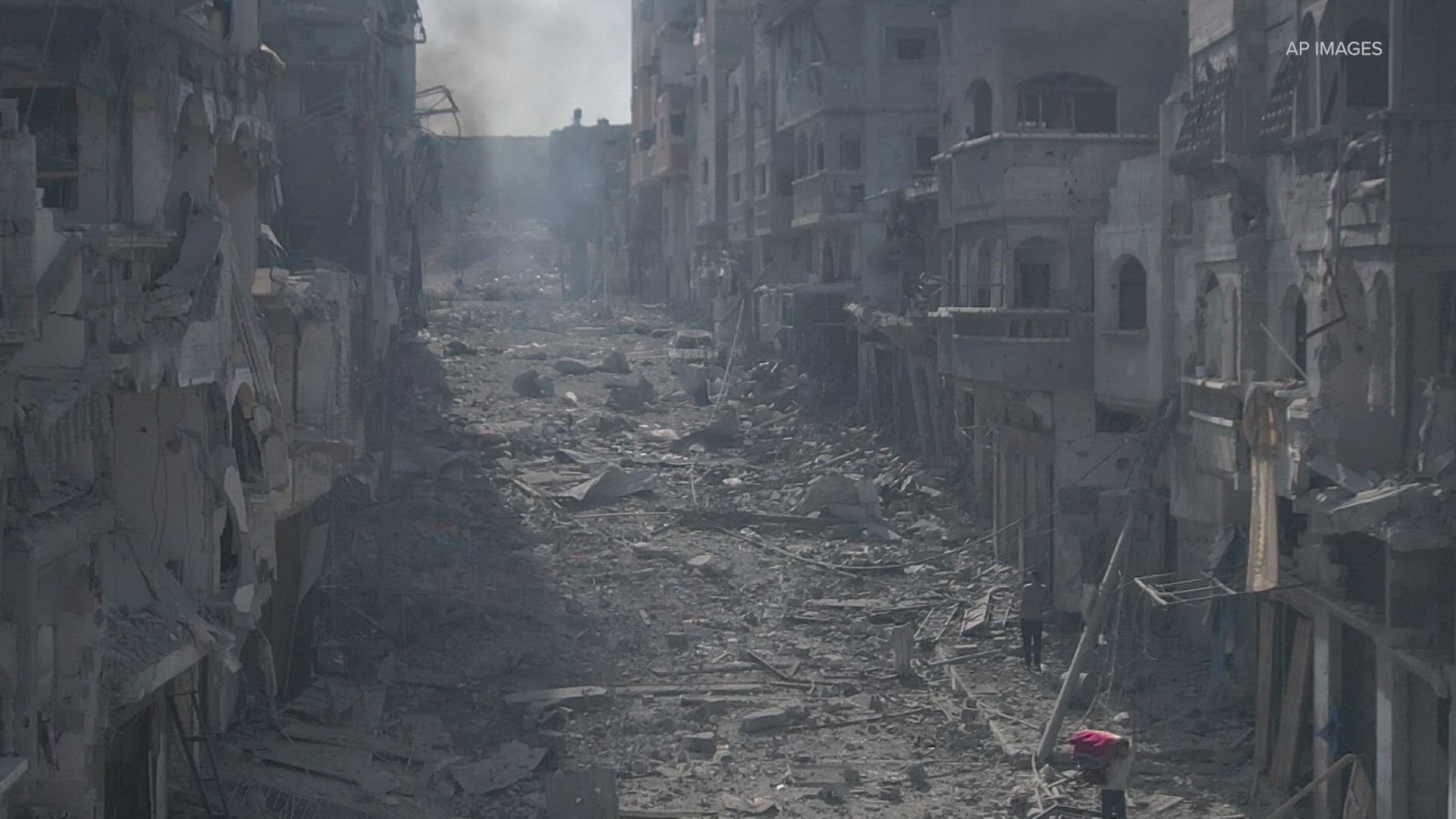Israel-Hamas conflict: History, local impacts and what happens next
There has been turmoil over the land area in the Middle East for over 150 years.

The Israel-Palestinian conflict has a long and complex history.
History that far predates this current war between Israel and Hamas. There has been turmoil over the land area in the Middle East for over 150 years.
History predating the current Israel-Hamas conflict The complex history started over a century ago.
Starting in the 19th century, the Zionist movement began in Europe, sparking the idea of creating a Jewish national home.
Dr. Nova Robinson is an associate professor of History and International Studies at Seattle University.
“When we think about the conflict, we often think about it as happening in the eastern Mediterranean, but instead the origins of the conflict are much more global,” Robinson said.
After World War I, when the Ottoman Empire was defeated, the British took control of the area known as Palestine and promised to establish a Jewish national homeland there.
In the 1930s, tension grew between the Zionists and Palestinians, who were mostly Arabian.
After World War II, the Zionist movement really gained traction.
In 1948, Britain left and the state of Israel was formed. The Arab-Israeli War began immediately. It was a pivotal year and both sides remember it very differently.
In more recent decades, fighting has continued.
There have also been numerous peace attempts in the region including the Oslo Accords in 1993, which meant to lay the groundwork to establish a Palestinian State alongside Israel.
That failed, in large part, because of a power imbalance.
To read more about the history of the conflict and how it relates to the current war, click here.
Students using their First Amendment freedoms College students across the country are protesting, but their passion has been met with resistance.
While campuses have long been seen as a place designated for young minds to gather and freely express their thoughts, some are now questioning that sense of security.
At Tulane University, the last week of October saw a violent clash between pro-Israel students and a pro-Palestinian group, prompting classes to be canceled and security to be tightened.
The university's president, Michael Fitts told NBC News that people came to campus to incite violence.
"Is it possible to have a fair-minded debate on this war that doesn't descend into hate speech, and threats or violence? So the promise of a university is exactly that, to engage in those conversations," Fitts said.
It's not just physical violence and hate speech that has students frightened. Some worry participation in the protests could dim their bright futures.
At Harvard University, pro-Palestinian student groups issued a joint statement condemning Israel's assault on Gaza, which prompted pushback from Jewish student groups accusing them of supporting Hamas.
It also prompted several CEOs to take notice.
Billionaire hedge fund CEO Bill Ackman and several other business leaders demanded Harvard release the names of those whose organizations signed the joint statement.
Several law firms have even rescinded job offers to top NYU Law School and Harvard students.
In Washington state, tensions flared as students at the University of Washington wasted no time calling others to action.
Ending the war is a common cause among them, though their messaging remains divided.
Sit-down with a Seattle rabbi Seattle Rabbi Daniel Weiner discusses the rise in antisemitism, his congregation's feelings about the attacks and the future of the conflict.
Jews all over the world are still stunned by the brutality of Hamas' Oct. 7 attack on Israeli civilians.
Feelings are still raw and difficult to talk about. Seattle Rabbi Daniel Weiner says the pain runs deep.
Weiner is a Temple Di Hirsch Sinai rabbi in Seattle's Capitol Hill neighborhood. He spoke about the heartbreak his congregation feels and the unexpected silence from friends and faith leaders.
"We are a small people, about 15 million throughout the world, the two largest populations of Jews are in the United States and in Israel," Weiner said. "We all have connections, friends, family who are in Israel, and with such a small population, all of us inevitably have direct connections to those who were murdered or one or two degrees of separation from those who were murdered."
Weiner's initial feeling after hearing about the Oct. 7 attack was one of disbelief.
"My initial reaction was, on the one hand, some degree of disbelief, but also a deep and abiding hurt, and a, I think, a rude awakening that our most cynical and darkest expectations of what those who hate us want to do, that that level of savagery and barbarism was still possible," he said.
Antisemitism since the event is up 400%.
"I think we're certainly hearing from so many folks about the horrific things that are being expressed and posted online," Weiner said. "What's heartbreaking to me is our children now are experiencing a different kind, but a level of antisemitism that our parents and our grandparents experienced."
To read the full interview, click here.
The United States urged to act A community advocate in western Washington, along with 20 others sent a letter to President Biden asking him to put a stop to the distribution of weapons to the IDF.
Jafar "Jeff" Siddiqui, a community advocate and chairman of American Muslims of Puget Sound detailed how the United States can leverage its power to help civilians in Gaza.
Siddiqui called the attacks on civilians on both sides a "moment of horror."
Siddiqui's organization, among 20 others, sent a letter to President Joe Biden asking for him to put a stop to the distribution of weapons to the IDF.
"Stop the firing, stop the shooting, stop the bombing," Siddiqui said. "Right now Israel has all the weapons the United States can send them and is using them very, very indiscriminately and liberally. That's not a war, that is a one-sided destruction of an entire people."
He is calling on the U.S. to intervene.
"Once the shooting stops, people can start talking," Siddiqui said. "You can not achieve peace by blowing people up."
What happens next? Experts weigh in on the likelihood of a military expansion and the next steps of the IDF and Hamas.
What happens next?
Steven Simon, a professor of Middle East Studies at the University of Washington and retired Army Gen. Barry McCaffrey discussed how likely an expansion will be in the following weeks, months or years.
McCaffrey said the IDF is fighting to destroy Hamas as the governing authority in Palestine.
"The key strategic challenge for the United States now is trying to prevent the widening of the war to include Lebanese Hezbollah and Iran," Simon said. "That would be extremely dangerous."
Simon said the U.S. has deployed a lot of military power to the region to deter Iran and Lebanese Hezbollah from going that route.
Israel is also currently rejecting all international calls for a cease-fire.
"Waiting in the wing are as many as 100,000 Hezbollah fighters with well over 100,000 rockets," McCaffrey said. "This war won't be over until the IDF dominates the streets and the subterranean terrain of North Gaza."
To watch the full interview with Steve Simon, click here.


